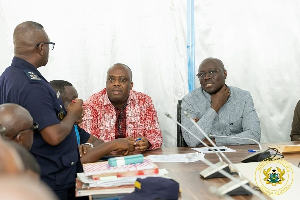Salaga (N/R), Dec. 3, GNA - The Northern Region has marked World AIDS Day in Salaga in the East Gonja District with a call on the people to avoid stigmatization and discrimination to help curb the disease. Mr. San Nasamu Asabigi, the Deputy Northern Regional Minister, said the celebration was to remind the public of the devastating impact of the HIV and AIDS pandemic.
He said efforts at reducing it would be in vain if stigmatization and discrimination against persons living with the disease was allowed to continue. Mr. Asabigi said Salaga recorded an increasing trend from 1.6 percent in 2008 to 1.8 in 2009 while the Yendi Municipality recorded the highest in the eastern corridor with a prevalence rate of 3.4 percent in 2008 from 0.4 percent in 2008.
He said though the national HIV prevalence rate had shown a downward trend, the Northern Region recorded an increase from 1.1 percent in 2008 to 2.0 percent in 2009. Mr. Alhassan Mumuni, the District Chief Executive for East Gonja, appealed to the government to negotiate with the manufacturers of the antiretroviral drugs to reduce its cost further to enable patients to afford them.
He said Kenya and South Africa had passed legislations that had enabled them acquire cheaper generic drugs for the treatment of the disease and urged the government to do similar.
Mr. Paul Kofi Twere, Programmes Manager of the Christian Children's Fund of Canada (CCFC) promised his organization's continues commitment to the fight against the disease adding that the rights of the people living with the disease must be respected by the society. He suggested that the Ghana Health Service should include HIV and AIDS programmes to its broad health and development agenda to ensure the fight against the disease was effective.
Mr. Sulemana Sulley, Northern Regional Chairman of People Living With HIV (PLWH) and AIDS, testified to the people how he acquired the disease in 2005 and had survived with till date and urged them to see HIV as any other normal disease and avoid stigmatization. He appealed to the government and development partners to extend help to the people living with disease since most of them were not working and find it difficult to meet their daily needs. 03 Dec 10
Health News of Friday, 3 December 2010
Source: GNA












